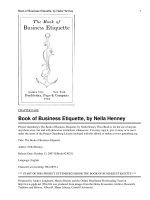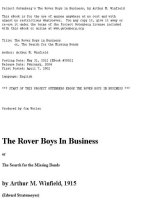Project Gutenberg''''s The Book of Business Etiquette, by Nella Henney potx
Bạn đang xem bản rút gọn của tài liệu. Xem và tải ngay bản đầy đủ của tài liệu tại đây (1.19 MB, 554 trang )
Project Gutenberg's The Book of Business
Etiquette, by Nella Henney
This eBook is for the use of anyone
anywhere at no cost and with
almost no restrictions whatsoever. You may
copy it, give it away or
re-use it under the terms of the Project
Gutenberg License included
with this eBook or online at
www.gutenberg.org
Title: The Book of Business Etiquette
Author: Nella Henney
Release Date: October 13, 2007 [EBook
#23025]
Language: English
*** START OF THIS PROJECT GUTENBERG EBOOK
THE BOOK OF BUSINESS ETIQUETTE ***
Produced by Audrey Longhurst, Marcia
Brooks and the Online
Distributed Proofreading Team at
(This
file was produced from images from the
Home Economics
Archive: Research, Tradition and History,
Albert R. Mann
Library, Cornell University)
The Book of
BUSINESS
ETIQUETTE
COPYRIGHT, 1922, BY
DOUBLEDAY, PAGE & COMPANY
ALL RIGHTS RESERVED, INCLUDING
THAT OF TRANSLATION
INTO FOREIGN LANGUAGES,
INCLUDING THE SCANDINAVIAN
PRINTED IN THE UNITED STATES
AT
THE COUNTRY LIFE PRESS, GARDEN
CITY, N. Y.
First Edition
RESPECTFULLY
INSCRIBED
(AS BEFITS AN AUTHOR)
TO
THREE BUSINESS MEN
ACKNOWLEDGMENT
It would be a pleasure to call over by
name and thank individually the business
men and the business organizations that so
graciously furnished the material upon
which this little book is based. But the
author feels that some of them will not
agree with all the statements made and the
inferences drawn, and for this reason is
unable to do better than give this meager
return for a service which was by no
means meager.
CONTENTS
ACKNOWLEDGMENT
CHAPTER PAGE
PART
I
I
The
American
Business
Man
1
II
The Value
of Courtesy
17
III
Putting
Courtesy
Into
Business
40
IV
Personality 70
Table
V
Manners 94
VI
Telephones
and Front
Doors
108
VII
Traveling
and Selling
130
VIII
The
Business of
Writing
153
IX
Morals and
Manners
183
PART
II
X
“Big
Business”
209
In a
XI
Department
Store
242
XII
A While
With a
Traveling
Man
250
XIII
Tables for
Two Or
More
268
XIV
Ladies
First?
279
Transcriber's Note:
Please note that the
book does not credit an
author. The Library of
Congress lists Nella
Henney as the author.
PART I
THE BOOK OF
BUSINESS
ETIQUETTE
I
THE AMERICAN
BUSINESS MAN
The business man is the national hero of
America, as native to the soil and as
typical of the country as baseball or
Broadway or big advertising. He is an
interesting figure, picturesque and not
unlovable, not so dashing perhaps as a
knight in armor or a soldier in uniform, but
he is not without the noble (and ignoble)
qualities which have characterized the
tribe of man since the world began.
America, in common with other countries,
has had distinguished statesmen and
soldiers, authors and artists—and they
have not all gone to their graves
unhonored and unsung—but the hero story
which belongs to her and to no one else is
the story of the business man.
Nearly always it has had its beginning
in humble surroundings, with a little boy
born in a log cabin in the woods, in a
wretched shanty at the edge of a field, in a
crowded tenement section or in the slums
of a foreign city, who studied and worked
by daylight and firelight while he made his
living blacking boots or selling papers
until he found the trail by which he could
climb to what we are pleased to call
success. Measured by the standards of
Greece and Rome or the Middle Ages,
when practically the only form of
achievement worth mentioning was
fighting to kill, his career has not been a
romantic one. It has had to do not with
dragons and banners and trumpets, but
with stockyards and oil fields, with
railroads, sewer systems, heat, light, and
water plants, telephones, cotton, corn, ten-
cent stores and—we might as well make a
clean breast of it—chewing gum.
We have no desire to crown the
business man with a halo, though judging
from their magazines and from the stories
which they write of their own lives, they
are almost without spot or blemish. Most
of them seem not even to have had faults
to overcome. They were born perfect.
Now the truth is that the methods of
accomplishment which the American
business man has used have not always
been above reproach and still are not. At
the same time it would not be hard to
prove that he—and here we are speaking
of the average—with all his faults and
failings (and they are many), with all his
virtues (and he is not without them), is
superior in character to the business men
of other times in other countries. This
without boasting. It would be a great pity
if he were not.
Without trying to settle the question as
to whether he is good or bad (and he
really can be pigeon-holed no better than
any one else) we have to accept this: He
is the biggest factor in the American
commonwealth to-day. It follows then,
naturally, that what he thinks and feels
will color and probably dominate the
ideas and the ideals of the rest of the
country. Numbers of our magazines—and
they are as good an index as we have to
the feeling of the general public—are
given over completely to the service or
the entertainment of business men (the T.
B. M.) and an astonishing amount of space
is devoted to them in most of the others.
It may be, and as a matter of fact
constantly is, debated whether all this is
good for the country or not. We shall not
go into that. It has certainly been good for
business, and in considering the men who
have developed our industries we have to
take them, and maybe it is just as well, as
they are and not as we think they ought to
be.
There was a time when the farmer was
the principal citizen. And the politician
ingratiated himself with the people by
declaring that he too had split rails and
followed the plow, had harvested grain
and had suffered from wet spells and dry
spells, low prices, dull seasons, hunger
and hardship. This is still a pretty sure
way to win out, but there are others. If he
can refer feelingly to the days when he
worked and sweated in a coal mine, in a
printing shop, a cotton, wool, or silk mill,
steel or motor plant, he can hold his own
with the ex-farmer's boy. We have become
a nation of business men. Even the “dirt”
farmer has become a business man—he
has learned that he not only has to
produce, he must find a market for his
product.
In comparing the business man of the
present with the business man of the past
we must remember that he is living in a
more difficult world. Life was
comparatively simple when men dressed
in skins and ate roots and had their homes
in scattered caves. They felt no need for a
code of conduct because they felt no need
for one another. They depended not on
humanity but on nature, and perhaps human
brotherhood would never have come to
have a meaning if nature had not proved
treacherous. She gave them berries and
bananas, sunshine and soft breezes, but
she gave them trouble also in the shape of
wild beasts, and savages, terrible
droughts, winds, and floods. In order to
fight against these enemies, strength was
necessary, and when primitive men
discovered that two were worth twice as
much as one they began to join forces.
This was the beginning of civilization and
of politeness. It rose out of the oldest
instinct in the world—self-preservation.
When men first organized into groups
the units were small, a mere handful of
people under a chief, but gradually they
became larger and larger until the nations
of to-day have grown into a sort of world
community composed of separate
countries, each one supreme in its own
domain, but at the same time bound to the
others by economic ties stronger than
sentimental or political ones could ever
be. People are now more dependent on
one another than they have ever been
before, and the need for confidence is
greater. We cannot depend upon one
another unless we can trust one another.
The American community is in many
respects the most complex the world has
ever seen, and the hardest to manage. In
other countries the manners have been the
natural result of the national development.
The strong who had risen to the top in the
struggle for existence formed themselves
into a group. The weak who stayed at the
bottom fell into another, and the bulk of
the populace, which, then as now, came
somewhere in between, fell into a third or
was divided according to standards of its
own. Custom solidified the groups into









